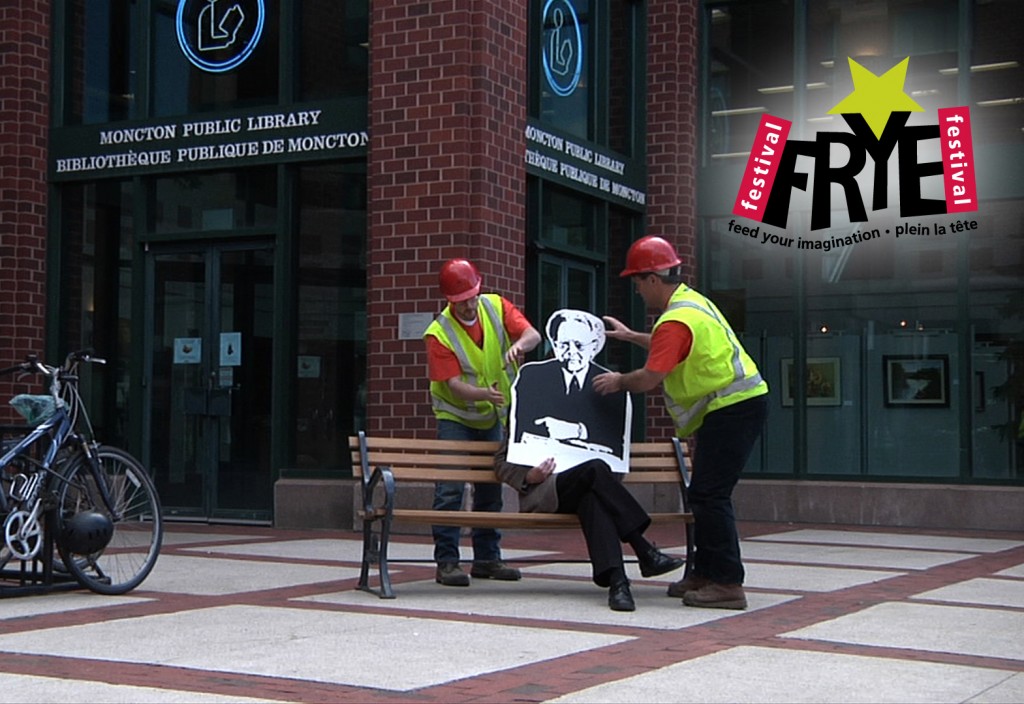The Frye sculpture proposal remains very much alive in third place — the top two finishers receive a $25,000 prize. Voting ends tomorrow. Vote today and tomorrow here.
Author Archives: Michael Happy
Glenn Beck: “There will be rivers of blood”
httpv://www.youtube.com/watch?v=aSFCoT2et_s
A mashup by Media Matters for America of Beck’s appropriation of the anniversary of Martin Luther King Jr’s “I have a dream” speech on Saturday, including a long string of incendiary lies and provocation from his radio and Fox News shows.
A taste of those lies and provocation: “I can tell you there will be rivers of blood.” “Very dark dudes are coming for us.” “There are Satan worshipers who are in office.” “That’s when the arrests start . . . that’s when the shootings start.” “Drive a stake through the heart of the bloodsucker.” And much, much more.
He’s no Martin Luther King.
Where I come from, we call that “eliminationist rhetoric.”
You decide.
Mary Wollstonecraft Shelley
httpv://www.youtube.com/watch?v=TcLxsOJK9bs
A real rarity: the Edison Studios 1910 film adaptation of Frankenstein — thirteen minutes and one reel, as was the fashion of the time. It is startling to think that just barely one lifetime after her death, Shelley’s novel was already being adapted at the very dawn of the film industry, making her monster one of the most recognizable of all movie characters, even if that character usually bore little resemblance to her original literary creation.
Today is Mary Shelley‘s birthday (1797-1851).
Frye on Frankenstein in A Study of English Romanticism:
An almost equally remarkable example of Romantic irony is Mary Shelley’s Frankenstein. The story is not, as it often is said to be, a precursor of science fiction: it is a precursor rather of the existential thriller, of such a book as Camus’ L’Etranger. The whole point about the monster is that he is not a machine, but an ordinary human being isolated from mankind by extreme ugliness, Blake’s “different face.” The number of allusions to Paradise Lost in the narrative indicate that the story is a retelling of the account of the origin of evil, in a world where the only creators we can locate are human ones. Frankenstein hunts down his monster in the same way that moral good attempts to destroy the moral evil that it has itself created: Frankenstein is as much a death principle as his quarry, and is surrounded by the vengeful spirits of his monster’s victims. (CW 17, 122)
The Beatles, Candlestick Park
Today is the 44th anniversary of the Beatles’ last concert at Candlestick Park, San Francisco.
Fifty-five seconds of lousy video that nicely captures what it must have been like to be there, here.
This was the Beatles’ last concert but not their last public performance, which didn’t occur till three years later on January 30th 1969. A much better clip of that event after the jump. (Notice how Austen Powers-y London looks: check out Ringo in his red plastic mac.)
Frye in discussion with Robert Fulford and Marty Gross on the ritualistic element of Beatles concerts:
[Fulford discusses the human need for ritual, as seen for instance in the intense emotion of the audience at a Beatles concert where the music could not be heard above the audience’s screams.]
Frye: You need different rituals at different times. There is something in the pantomime, where you don’t hear the words, that has a very direct childlike appeal. So it didn’t matter whether you heard the Beatles, as long as you saw them. The response to the aural stimulus is something that develops much more gradually. (CW 24, 542)
Perhaps that’s what makes the next clip so poignant. There’s no more Beatlemania, no more adolescent girls screaming like Bacchantes. The Beatles’ last audience was just a random collection of people (including a number of noticeably middle-aged Londoners, who are somewhat stiff and formal but evidently still fans) who found their way to nearby rooftops so that they could watch and hear the Beatles in public for what turned out to be the last time.
Quote of the Day: “Conservatives and ‘Limited Government'”
Tim Lee adds a much-needed dose of sanity to the anti-big-government movement. Full post here.
Is the Tea Party “the most dynamic anti-big government political movement in modern American politics?” I think it’s helpful here to unpack the concept of “anti-big government,” because the right uses it in a peculiar and rather perverse fashion.
In the conservative (and fusionist) worldview, government activities are evaluated using a simplistic “size of government” metric that treats every dollar of government spending as equally bad, regardless of how it’s used. This has some unfortunate results. It means that cutting children’s health care spending is just as good as cutting a dollar from subsidies for wealthy corporations. And since wealthy corporations typically have lobbyists and poor children don’t, the way this works out in practice is that conservative politicians staunchly oppose the former while letting the latter slide.
Worse, mainstream conservatives give programs involving the military and law enforcement a free pass. Conservatives vociferously (and correctly) oppose giving the FCC expanded power over the Internet, but they actively supported the NSA’s much more comprehensive and intrusive scheme of domestic surveillance. Conservatives support a massive expansion of government power at our southern border to restrict the freedom of Mexican migrants. They seem unconcerned by the fact that we have more people in government-run prisons than any other nation on Earth.
This distinction makes no sense. When American soldiers gun down Iraqi civilians and blow up a van that comes to rescue the survivors, that’s a government program. When a SWAT team conducts a military-style raid on the home of an innocent Maryland mayor and kills his dogs, that’s a government program too. Obviously, law enforcement and national defense are important functions of government, but these highly coercive government programs should be the subject of more public scrutiny, not less.
In-depth investigation of plutocratic interests behind the Tea Party and global warming denialism movements here.
Saturday Night Documentary: “Outfoxed”
httpv://www.youtube.com/watch?v=ok01hJHvobM
Today is the 47th anniversary of Martin Luther King Jr’s historic “I have a dream” speech at the Lincoln Memorial (video here). Self-confessed “rodeo clown” Glenn Beck chose to hijack the occasion to give a speech of his own on the very spot that great speech was delivered (or, as Beck hilariously put it in a smarmy show of false humility, “a few steps down” from the actual spot). That makes this an opportune time to take a closer look at Fox News as the nihilistic propaganda machine it really is.
Louis Menand in a recent online posting at the New Yorker writes about the documentary scene after Fahrenheit 9/11, including this powerful, widely viewed but never distributed indictment of Fox News, Outfoxed.
Here’s Menand:
One common reaction to “Fahrenheit 9/11” is that it shows you things that have never been seen before—the “Pet Goat” and “Now watch this drive” clips, scenes of carnage and brutality in Iraq, Saudi-schmoozing, Ashcroft singing, Al Gore being forced to reject repeated petitions by black representatives to contest the official counting of the electoral-college votes in the 2000 election. It may be that most of these things were shown somewhere, but the movie is designed to make audiences feel that they have never been seen, or that, having been seen, they have been deliberately suppressed. Robert Greenwald’s “Outfoxed: Rupert Murdoch’s War on Journalism,” a movie that has yet to tempt a distributor but has been exhibited in special screenings, and that circulates, samizdat style, on videotape and DVD, is a forceful reminder of how vicious the cheerleading is. “Outfoxed” ought to be a redundant exercise. The right-wing bias of Fox News, whose laughable motto is “Fair and Balanced,” is not something that ought to require a documentary to uncover. But where is the mainstream media? The answer is that the mainstream media is a place where Tucker Carlson is identified as a “political analyst.” Reporting on television is now accompanied by so much partisan yapping disguised as analysis, and there is such a panic to get anything on the air that comes over the transom regardless of the source (like pictures of John Kerry in a silly hat), that the other networks have to feel uncomfortable about accusing anyone else of confusing news with opinion. “Outfoxed” suggests, in fact, that competing news organizations, like CNN, having seen that flag-waving attracts viewers, are starting to imitate Fox.
There may be a few viewers out there who continue to confuse Bill O’Reilly with Eric Sevareid. “Outfoxed” will disabuse them.
The rest of the film after the jump.
Frye Sculpture: Four Days Left
St. Augustine of Hippo
On this date in 430 St. Augustine of Hippo died (born 354).
Yesterday we quoted Frye on Hegel from his student essay written in 1933, “The Augustinian Interpretation of History.” That essay is a good place to start today too. In the essay, by the way, Frye cites a quote from Hegel that might be kept in mind: “We learn from history that we never learn anything from history” (CW 3, 193).
First then, for Augustine, the political problem, the collapse of the Roman Empire. It was easy to accuse the upstart religion to which Augustine belonged of having caused the downfall, and the first ten books [of The City of God] are taken up with defending the Christians and attacking the pagans. For our present thesis this is important in clearing the ground for the doctrine of the two cities. The immediate, obvious opposition Augustine had to contend with was that of paganism and Christianity; not until that was outlined could the theory of the two cities follow. The latter is an abstract conception of some difficulty, and to introduce it at the outset would upset what balance the book still retains. Although it is not deliberately a philosophy of history, but an apologetic, the germ is there. Almost at once Augustine outlines the essential change that the coming of Christianity has made in the world. Christianity is not responsible for the fall of Rome (I, i), in the sense that the Romans have failed through deserting the gods that could have helped her. These same gods lost Troy (I, iii); how should they preserve Rome? On the other hand, Christianity has brought an entirely new note of gentleness: Rome’s Christian conquerors spared her to an extent which Rome herself never practiced toward her foes (I,ii). In the ancient world there was no idea of anything else than the most brutal revenge in warfare (I, iv). No, the cause of the Roman defeat lay in herself (II), in her essential weakness and wickedness. Her empire, allotted to her as a reward for certain terrestrial virtues (V), such as justice, temperance, courage, and so on–on which Augustine dwells with much enthusiasm–has been forfeited by her vice. (CW 3, 200)
TGIF: The Philospher’s Drinking Song
Frye Sculpture: Very, Very Close!
httpv://www.youtube.com/watch?v=47PGGjiLd54
According to the latest Frye Festival Newsletter, the Frye sculpture proposal has jumped from fifth to third place.
The top two finishers receive a $25,000 prize. That means the good people at the Frye Festival are very close to realizing this project.
Voting closes on Tuesday, August 31st.
You can vote daily for the sculpture here.
Latest Frye Festival Newsletter here.




